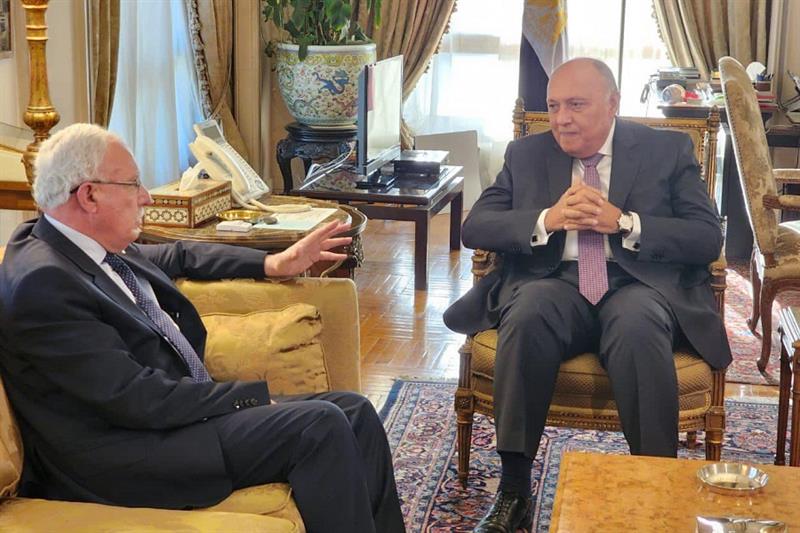

Egyptian Foreign Minister Sameh Shoukry (R) receives Palestinian Foreign Minister Riyadh Al-Maliki in Cairo, 29 November 2022. Egyptian Ministry of Foreign Affairs

Egypt marked on Tuesday the International Day of Solidarity with the Palestinian People, which the UN General Assembly calls for observing on 29 November every year since 1978.
The 29 November date is of significance to the Palestinian people, for on that day, in 1947, the UNGA adopted the Partition Plan of Palestine, Resolution 181, which endorsed establishing an Arab state and a Jewish state in historic Palestine.
“Egypt marks this day in solidarity with the steadfast people of Palestine and in confirmation of the existence of the Palestinian cause alive in international forums and in the global conscience,” the Egyptian Ministry of Foreign Affairs said in a statement on Tuesday.
The ministry stressed that such global conscience stands in support of the Palestinian people in their just and legitimate demands as well as in support of their right to establish their independent state.
“The Palestinian cause will always remain the Arab’s top issue. As part of their historical responsibility, Egypt’s government and its people remain constantly supportive of the Palestinian cause as the central issue of the Arab world,” the statement added.
The ministry also affirmed that Egypt will exert every effort until the Palestinian people obtain their legitimate right in establishing their independent state.
“The constants of the Egyptian position toward the Palestinian cause has not and will not change, and [Egypt’s] commitment to the cause of Palestine, the Palestinian people, and Jerusalem and its Al-Aqsa mosque is an authentic commitment,” the ministry said.
Egypt also stresses the necessity to put an end to the cycle of violence in the occupied Palestinian territories and to stop the unilateral measures that undermine fair and final settlement efforts, the ministry said.
The most significant among these unilateral measures include conducting illegitimate settlement activities, evicting and evacuating Palestinians in the city of Jerusalem, changing the demographic nature of the city, and dividing Al-Aqsa Mosque and its vicinity both temporally and spatially, the ministry stressed.
“Egypt, based on its historical responsibility and commitment to uphold the inalienable rights of the Palestinian people, will continue to exert its tireless and sincere efforts to resume the peace process and encourage the parties to come back to the negotiations table with the support of the international community and partners,” the ministry added.

Palestine back to int’l focus
To mark the day, Egypt’s Foreign Minister Sameh Shoukry received in Cairo his Palestinian counterpart Riyad Al-Maliki.
During the meeting, both officials discussed coordinating efforts on the regional and global levels “to bring back the Palestinian cause to the international focus,” the ministry said.
This comes through coordinating efforts with other Arab partners and international parties known for their support of the Palestinian rights, the ministry cited the FMs as saying.
The top Egyptian diplomat highlighted Egypt’s continuous efforts with various international and regional parties to calm the situation, stop violence, and break the current stalemate in the peace process.
Such efforts aim to relaunch a serious negotiations track that leads to achieving comprehensive and just peace based on the two-state solution and international legitimacy resolutions of reference.
Palestine Resolution 181
The founding of the state of Israel in 1948 spelled disaster for the one million Palestinian inhabitants of historic Palestine.
In 1947, the UN Special Committee on Palestine (UNSCOP) approved “UN Resolution 181” calling for the partition of historic Palestine into two separate states, a Jewish State and an Arab State.
The decision was approved after member countries of the UN General Assembly voted on the partition plan, with 33 votes to 13 with 10 abstentions.
The two states would be joined by an “economic union” with the city of Jerusalem governed under an international administration, the UN partition plan stated.
Although Palestinians comprised about 67 percent of the population of Palestine, they were allocated far less land than their Jewish counterparts (33 percent of the total population) many of whom were recent immigrants from Europe.
Much to the dismay of the Palestinians, the plan allocated approximately 55 percent of the land to the Jewish state and just 42 percent to the Arab state.
Despite Jews owning only about 7 percent of the land in 1947, they were allocated more than half the area of historic Palestine.
Short link:






GIPHY App Key not set. Please check settings